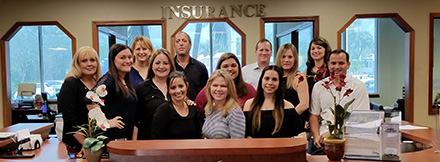Types of Homeowners Insurance Available in Florida, the Sunshine State
January 15, 2025
A real estate closing is only the start of a new journey, where years of investment finally get you to the point of owning your dream home. From there, the goal is building a new routine in a place that's both safe, comfortable, and geographically convenient, and homeowners insurance is an important asset to help you go about it without stressing about the future. Let's see how that looks in practice, assessing each type of insurance policy and how they can help you prevent financial loss after a sudden emergency.
What Is Homeowners Insurance?
Homeowners insurance protects you against the financial loss that's caused in the aftermath of property damage. This damage can be caused by natural disasters, accidents, vandalism, and other external factors. A homeowners insurance policy covers the costs of any structural damage caused to your home and/or personal property (furniture, clothes, electronics, home appliances, etc.)While not a requirement in many Florida counties, homeowners insurance has still become a standard step to complete during the closing process. Homeowners know the importance of protecting their property from external damage and there are many variables to consider, as shown by the perils listed in some of the insurance policies available inside the state.
The types of policies are mainly determined by the structure of the property, but they also differ on the amount of coverage provided. Many properties in Florida have a high market value while sitting in high-risk areas, so its no wonder that the most popular policies cover different types of structural damage on top of personal property.
Types of Homeowners Insurance in Florida
- Owner-Occupied: As the name suggests, this policy is not viable if you rent the property to someone else. The home's legal owner must also be occupying the property for the duration of the policy's coverage. The three following policies are the go-to choice for coverage when it comes to single-family homes; it all depends on how many factors/incidents you want to have protection from.
- HO-1 (basic form): Because their coverage is so limited, HO-1 policies are not available in many states and downright rejected by many mortgage holders, so they're far from the standard in most parts of Florida. This policy covers any damage caused by 11 specified perils, including fire, lightning, windstorms, and hail, but you won't have liability or personal property coverage.
- HO-2 (broad form): This policy covers all the perils specified on the basic form along with seven additional factors, including accidental damage and living expenses when the insured property is unsuitable for living. If the peril isn't named in the form, it's not covered by the policy.
- HO-3 (special form): The special form policy provides the most extensive coverage out of the three, and it's the most commonly used type of homeowners insurance. It covers the structure for all perils except those specifically excluded in the policy. That means that any type of damage that isn't listed on the form still qualifies for insurance coverage.
- Renters, Tenants form or HO-4 form: This policy will cover your personal property and liability after you rent or lease the house, as well as additional living expenses when the insured property is unsuitable for living. As explained in an article by Progressive, the HO-4 policy won't cover the damage caused to the structure by wear and tear, natural disasters, or vandalism.
- Comprehensive form or HO-5 form: Its coverage is very similar to the HO-3 form, encompassing all perils outside of those excluded on the contract, along with personal property costs. While available in parts of Florida, this policy can be hard to find when compared to the HO-3 form.
- Condominium Unit-Owners form (HO-6): This coverage is chosen by condo owners to protect the personal property and liability of the insured. Similar to the HO-1 and HO-2 policies, it covers a limited number of perils that are listed in the form, depending on how much of the structure is covered by the condo/homeowners association. By purchasing a special endorsement, however, you can have coverage for all perils outside of those excluded in the contract.
With this policy, there's also the option of Loss Assessment Coverage. The Florida Department of Financial Services explains that policies must include at least $2,000 of loss assessment coverage with a deductible no greater than $250. This coverage pays for your share of expenses for a covered loss to common property shared by all unit owners, up to the coverage limit. - Mobile Home form or HO-7 form: This policy is designed to protect mobile or manufactured homes. Instead of offering this specific coverage, many insurance companies have repurposed other types of policies to provide coverage for these properties.
- Modified Coverage form or HO-8 form: This policy is usually reserved for older properties with higher replacement/repair costs. It functions like standard home insurance but might likely provide limited coverage when compared to the HO-2 form.
- Dwelling Form: These policies cover the risks that don't qualify in a standard homeowner's insurance. A dwelling form is one of the primary offers made by insurers when the HO-7 form isn't available, but it also suits other types of properties like older homes or a property that's on a lease.
Get a Policy That's Tailored to Your Needs
Key Title & Escrow is always in tune with Florida's competitive real estate market, so we understand the importance of homeowners insurance. We work with renowned insurance carriers from all over the country, so you can count on us to ensure that nothing is overlooked as you choose the best coverage for your new house. Likewise, we can assist you if you want to change policies after making a change in your living conditions.Our connections and professional experience give us the knowledge to provide the assistance you need, outlining the areas that should be included in the policy and helping you narrow down the options that suit your budget.
Getting the right insurance coverage is a crucial part of the escrow process and Key Title & Escrow is here to help you make the best choice.
We invite you to check out our website and learn all you need to know about Florida's real estate industry, from the escrow process to title and homeowners insurance. Our specialists have decades of combined experience assisting Florida clients with the best title search, closing, and escrow services, so you can count on us to give you the information you need. You can call (305) 235-4571 or toll-free at (800) 547-0006 to get in touch with us. Or if you prefer, feel free to send us your questions via the contact form on this page, and our staff will assist you right away.







